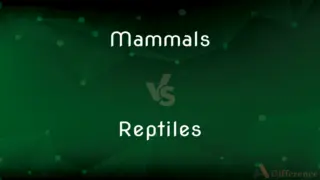In Future vs. In the Future — What's the Difference?
Edited by Tayyaba Rehman — By Fiza Rafique — Published on November 24, 2023
"In future" implies a general time from now onward, often used in British English; "In the future" specifies an unspecified point or period coming later, common in American English.

Difference Between In Future and In the Future
Table of Contents
ADVERTISEMENT
Key Differences
"In future" is a phrase commonly used in British English to indicate that something will happen continuously from now on. In contrast, "In the future" is more prevalent in American English and points to an indefinite time later than the present.
"In future" can sometimes carry an admonishing tone. For instance, "In future, please knock before entering" implies an expectation for all subsequent times. On the other hand, "In the future, I'd like to travel to Japan" using "In the future" talks of a specific, albeit undefined, time ahead.
It's important to note regional differences. While "In future" might sound completely natural to someone from the UK, an American listener might expect the additional "the", as in "In the future".
Both "In future" and "In the future" hold anticipatory meanings, but their usage varies depending on the context and the form of English being used. In most global contexts, especially in formal writing or international settings, "In the future" might be preferred for its clarity.
Lastly, language is ever-evolving. While these distinctions hold true currently, usage patterns might change as languages adapt and intermingle. Both "In future" and "In the future", however, clearly convey looking ahead to a time beyond the present.
ADVERTISEMENT
Comparison Chart
Geographical Preference
More common in British English
More common in American English
Connotation
Often implies a continuous action from now on
Refers to an unspecified point or period in the future
Usage in a Directive
Can be used in an admonishing tone
Less commonly used in admonitions
Presence of the Article "the"
Lacks the article "the"
Includes the article "the"
Clarity in International Context
Might be ambiguous in global settings
Generally clearer due to its widespread use
Compare with Definitions
In Future
"In future" hints at a change or adaptation starting now.
In future, meetings will be held online.
In the Future
"In the future" alludes to an unspecified time later than now.
I hope to visit Europe in the future.
In Future
"In future" emphasizes regularity or a new standard.
In future, employees must clock in by 9 AM sharp.
In the Future
"In the future" hints at possibilities or developments down the line.
Advancements in medicine in the future could increase life expectancy.
In Future
"In future" can have an advisory or cautionary tone.
In future, always wear safety gear during the experiment.
In the Future
"In the future" is a common American English expression for times ahead.
In the future, we might see flying cars become a reality.
In Future
"In future" refers to all subsequent times from the present.
In future, ensure all reports are submitted on time.
In the Future
"In the future" doesn't specify when, just that it's after the present.
In the future, we'll reflect on these times and learn.
In Future
"In future" is a British English way of indicating from now onward.
In future, I will take the train instead of driving.
In the Future
"In the future" denotes plans or aspirations for coming times.
In the future, I plan to start my own business.
Common Curiosities
Which is more common in American English: "In future" or "In the future"?
"In the future" is more commonly used in American English.
Does "In future" always have an admonishing tone?
No, but it can be used in an advisory or cautionary context.
Can "In the future" be used to talk about a continuous action from now?
It's typically used to refer to an unspecified point in time ahead, not continuous action.
Are there other phrases similar to "In the future"?
Yes, phrases like "down the line" or "someday" have similar meanings.
How can I use "In future" in a sentence?
Example: "In future, please ensure you arrive on time."
Is "In future" grammatically correct?
Yes, especially in British English where it's commonly used.
Which phrase should I use in a formal international report?
"In the future" might be preferred for clarity in international settings.
Can "In future" refer to a specific time ahead?
Generally, it implies a continuous action from now on, not a specific time.
Are there contexts where neither phrase is suitable?
Context is key. If a specific time or date is required, it's better to be explicit.
Does "In the future" always require the article "the"?
In American English, "the" is typically included, making it "In the future".
Is "In the future" more definitive than "In future"?
Neither is definitive, but "In the future" refers to an unspecified time ahead.
Which phrase should I use when giving instructions?
Both can work, but "In future" might be more direct for continuous instructions.
Do all English speakers understand both phrases?
While there are regional preferences, most English speakers will understand both.
Share Your Discovery

Previous Comparison
Mammals vs. Reptiles
Next Comparison
Line Authority vs. Staff AuthorityAuthor Spotlight
Written by
Fiza RafiqueFiza Rafique is a skilled content writer at AskDifference.com, where she meticulously refines and enhances written pieces. Drawing from her vast editorial expertise, Fiza ensures clarity, accuracy, and precision in every article. Passionate about language, she continually seeks to elevate the quality of content for readers worldwide.
Edited by
Tayyaba RehmanTayyaba Rehman is a distinguished writer, currently serving as a primary contributor to askdifference.com. As a researcher in semantics and etymology, Tayyaba's passion for the complexity of languages and their distinctions has found a perfect home on the platform. Tayyaba delves into the intricacies of language, distinguishing between commonly confused words and phrases, thereby providing clarity for readers worldwide.












































